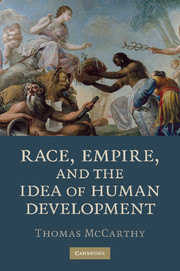Book contents
- Frontmatter
- Contents
- Acknowledgments
- Introduction
- Part One
- 1 Political philosophy and racial injustice: a preliminary note on methodology
- 2 Kant on race and development
- 3 Social Darwinism and white supremacy
- 4 Coming to terms with the past: on the politics of the memory of slavery
- Part Two
- Conclusion: the presence of the past
- Index
- References
4 - Coming to terms with the past: on the politics of the memory of slavery
Published online by Cambridge University Press: 05 June 2012
- Frontmatter
- Contents
- Acknowledgments
- Introduction
- Part One
- 1 Political philosophy and racial injustice: a preliminary note on methodology
- 2 Kant on race and development
- 3 Social Darwinism and white supremacy
- 4 Coming to terms with the past: on the politics of the memory of slavery
- Part Two
- Conclusion: the presence of the past
- Index
- References
Summary
We can no longer afford to take that which was good in the past and simply call it our heritage, to discard the bad and simply think of it as a dead load which by itself time will bury in oblivion … This is the reality in which we live.
Hannah ArendtIt seems that wherever one turns these days questions of how to deal with difficult pasts have risen to the top of national and international agendas. The general premise of this chapter is that the United States has not yet adequately dealt with the many forms of racial injustice endemic to its national past; and its general approach is that our thinking about this failure, its consequences, and possible remedies can be sharpened by drawing upon the German case, particularly Germany's renewed efforts in the 1980s and 1990s to face the painful truth of the National Socialist past of the 1930s and 1940s. In that situation, the forum in which public memory was exercised and consciousness raised was a debate among historians – a Historikerstreit – that spilled over into public awareness. That peculiar circumstance allowed the links between changing public memory and changing political culture and collective identity to appear in sharp relief. One key issue in that debate concerned the role that anti-Semitism, as a racialized mode of perception and interaction, played in the Holocaust.
- Type
- Chapter
- Information
- Race, Empire, and the Idea of Human Development , pp. 96 - 128Publisher: Cambridge University PressPrint publication year: 2009



